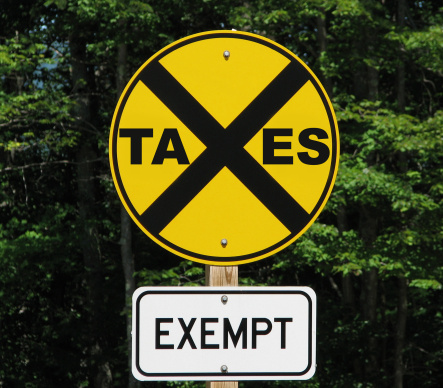The United States tax code is a hopelessly complex mess with as many loopholes for the wealthy as there are stars in the sky. There are many tax benefits of going offshore, and some of them can great for the “regular guy.”
Multinational corporations and billionaires spend big money on political campaigns and on lobbyists to ensure their interests are protected, and they expect a strong return on these “investments.” For example, a 2009 study found that each dollar put toward lobbying translated into $6 to $20 of tax benefits. Searching through these negotiated tax breaks leads you to a list of tax benefits of going offshore.
Just how ridiculous has the US tax code gotten? According to the IRS, taxpayers spent more than six billion hours in 2011 complying with the tax code – that’s enough to create an annual workforce of 3.4 million people. If that workforce was a city, it would be the third largest city in the United States. If that workforce was a company, it would employ more individuals than Walmart, IBM, and McDonalds, combined.
Even the mighty IRS seems overwhelmed by the complexity of the current tax laws. According to the National Taxpayer Advocate – part of the Internal Revenue Service – the Service cannot meet the needs of taxpayers.
Of the 115 million phone calls the IRS received in fiscal year 2012, it was only able to answer (actually pick-up) 68 percent of the calls. The IRS also failed to respond to almost half of all taxpayer letters within the agency’s own established time frame. And in 2011, the U.S. Treasury Inspector General’s reported to Congress that most taxpayers who contact the IRS do not receive helpful responses.
Such complexity means that the well informed and well represented have a major advantage over the average citizen. While billionaires can afford hundreds of thousands of dollars a year in legal fees to structure their affairs to minimize tax, diversify their investments, and protect their assets, the average citizen is at a major disadvantage.
With this in mind, I spend my time researching and writing on the various ways the average person might utilize the tools designed for the Googles and Mitt Romneys of the world for their benefit. It is my hope that my website and articles will level the playing field just a bit.
Tax Benefits of Going Offshore
In the world of international tax planning, there are many regulations that can be utilized by anyone living, working, or investing abroad, to reduce your US tax bill. Some will eliminate tax on your salary, or allow you to opt out of the Social Security and Medicare taxes, while others, such as those that apply to IRA LLCs, can allow you to invest in just about anything offshore, with leverage, tax free.
The information provided below on the tax benefits of going offshore is a brief summary of a variety of complex tax rules. It is not meant as a complete analysis of these laws, nor is it tax or legal advice specific to your situation. Please contact me at info@premieroffshore.com or at (619) 483-1708 to discuss your situation in detail.
Foreign Earned Income Exclusion
The key to many of the offshore tax benefits of going offshore is the Foreign Earned Income Exclusion. This section of the tax code allows you to earn up to $97,600 from work, either as a self-employed person or as an employee. To qualify, you must be out of the US for 330 out of 365 days or a qualified resident of another country.
Anyone living and working abroad can qualify for this exclusion, so long as you meet the requirements of the 330 day test or the residency test, you are golden. The exclusion applies to Federal Income Tax, and not Self Employment tax, so additional planning may be required if you are running your own show.
I note that only those living in low tax countries will get much play from this exclusion. If you are based in a place with a tax rate that is about the same, or even higher, than the United States, then the Foreign Tax Credit will step in and prevent double taxation, without the need for the FEIE.
In other words, if your US Federal tax rate is 35%, and your rate in France is 40%, you have no need of the FEIE because you are already paying more in tax than you would in the United States. You can deduct your French tax on your US tax return without concerning yourself with qualifying for the FEIE.
Conversely, if you are living tax fee in Panama, drawing a salary of $100,000, and fail to qualify for the FEIE, then 100% of your income is taxable in the United States. Without the FEIE, there is no benefit to working abroad in a low tax country!
Take Your Retirement Account Offshore
By moving your IRA or other retirement account in to an offshore LLC, you can take control over your savings, invest in foreign real estate or projects, and hold cash outside of the United States in any currency you like. Even better, you can do all of this while maintaining the tax free or tax deferred status these accounts enjoy.
For the sophisticated investor, the tax benefits of going offshore can be enormous! I will list the in order of importance.
First, if your IRA invests in certain hedge funds (typically, the most profitable ones), the income generated is probably taxable to your IRA at the prevailing corporate tax rate, which is currently 15% to 39%. Most investors will pay about 34% on taxable income earned in their retirement account. In addition, you must file IRS Form 990-T to report that income and pay the tax.
– Note that only very specific types of income, known as Unrelated Business Income (UBI), is taxable in a retirement account. This tax is called UBIT.
By moving your IRA in to an offshore LLC, and investing through a UBIT Blocker Corporation, you can completely eliminate UBIT. Your IRA can invest in a hedge fund, or any other UBI generating venture, and pay zero US tax.
This tax loophole was created for large pension funds, but is available to any tax exempt organization or charity, including offshore IRA LLCs. Hedge funds that wish to attract pension funds, retirement accounts, or non-US investors, must set up an offshore module of their fund (known as a Master/Feeder structure), whereby the tax exempt groups (your IRA) and foreign persons invest in the offshore division, while US persons invest in the US division. Then, these groups are combined in the master fund, from which investments are made and returns generated.
Offshore IRA LLCs have been used by the uber rich for years, and became big news during the previous presidential election. Many news outlets reported that Mr. Romney was able to grow his IRA LLC to over $100 million through the use of this type of international tax planning. To read more about his use of these structures, click here for the NY Times and here for a very partisan article on the Huffington Post.
Likewise, IRA LLCs that wish to invest in an active business will benefit from being offshore. Your IRA LLC can own up to 50% of any active business. The profits generated, especially if that business is structured as a partnership, are often Unrelated Business Income and taxable to the IRA.
If the company is offshore, then it may be operating free of US income tax. If you buy in through a specially designed offshore IRA LLC, profits paid out to you may also be tax free because your offshore structure effectively blocks the US from taxing those profits. For additional information, see the UBIT Blocker section of my website.
Those are the basics of taking your IRA offshore…child’s play, if you will. Here is the monster tax benefit of going offshore: You can eliminate UBIT on leverage by going offshore. Let me explain.
When you borrow money, or leverage up your IRA, the profits generated from that leverage are taxable (under the UBIT rules). So, if you buy a rental property for $100,000 with your IRA, paying $50,000 from your retirement account and get a non-recourse loan of $50,000 for the balance, when you receive rental payments, or sell the home, 50% of the net income will be taxable as UBI.
The same is true with brokerage and forex accounts. Your provider may be willing to give you 10 to 1, 30 to 1 or even 100 to 1 leverage on your deposit. But, if this is an onshore retirement account, the profits generated with that leverage are taxable.
By taking these transactions offshore, through a specialized offshore IRA LLC with UBIT Blocker Corporation, you can eliminate UBIT on borrowing and leverage. Tax free leverage is the key to generating big tax free profits in your retirement account.
For the “asset protection” benefits of moving your retirement account offshore, see my article: Can the Government Seize my IRA? If you are concerned with privacy or protecting your IRA from creditors and government appropriation, moving your IRA offshore, and in to a bank that does not have a branch in the US, is your best and only defense.
Stop Paying Social Taxes
Are you tired of supporting the Obamanation through social and medical taxes? Or, forgetting the political hyperbole, do you want to cut your US taxes? You can opt out of employment and social taxes by moving offshore. If you qualify for the Foreign Earned Income Exclusion, and are an employee of a company based outside of the US, then you need not pay Social Security, Medicare, or any other social taxes on your salary.
However, if you are an independent contractor, or are otherwise self-employed, then you must still pay Self Employment tax, at a rate of around 15%. So, assuming you qualify for the FEIE, on a salary of $97,000 you pay no Federal Income Tax but around $14,000 in SE tax. For a husband and wife, each drawing a salary, the SE tax will doubled to about $28,000.
The same is true if you are an employee of a US corporation while living abroad. You get the benefit of the FEIE, but must pay your share of social taxes (about 7.5%), as must your employer. All Social Security, Medicare, Obamacare, and related taxes still apply to the Expat and his employer, so long as you are employed by a US company.
Like the employee of a foreign company, you can eliminate SE tax by incorporating your business offshore and become an employee of that company. You can incorporate in any tax free country (such as Belize), and it does not matter where you are living or working, it does not matter if you are the owner and sole employee, nor does it matter if all of your clients are in the United States. So long you are living and working abroad, qualify for the FEIE, and are running an active business, you can eliminate SE tax by incorporating offshore. Your corporation should bill your clients and you can draw a salary from the net profits that entity of up to the FEIE amount (currently $97,600).
– You might combine the offshore company with a US LLC if you wish to open accounts in the US and get paid by check, PayPal, or credit card.
Defer Tax with Offshore Mutual Funds
For the uninitiated, investing in an offshore mutual is a bad idea. Punitive rules (the opposite of loopholes) have been written in to the tax code by the US mutual fund industry which are quite hostile to investing in these types of products offshore.
In most cases, an offshore mutual fund investment is governed by the Passive Foreign Investment Company (PFIC) section of the code. Like a US mutual fund, you only pay tax when you cash out. But, unlike a US fund, the tax man is going to crush your profits. First, when tax is paid, all income and gains are taxed at the highest ordinary income rate (presently 39.6%). There is no long-term capital gains treatment. Second, losses are disallowed. Third, you have to assume that all of the gains are earned ratably over the time the investment was held — even if the fund lost money the first few years and only made its gains in the last year when you cashed out. Why is that bad? Because of the final part of the quadruple whammy – interest charges, compounded annually. Annually compounded interest at the underpayment interest rate (which is set by the Treasury Department each quarter and has been anywhere from 5% to 10% over the last several years) is charged on deferred tax.
And here is the loophole for the offshore professional: If the PFIC meets certain accounting and reporting requirements, a PFIC shareholder can elect to treat the PFIC as a qualified electing fund. The effect is that the PFIC shares are taxed like U.S. shares. The owner of a foreign mutual fund treated as a QEF may: 1) elect to pay tax on income as it is accrued in your account, or 2) choose to defer tax until money is received. If both the QEF and deferral elections are made, you pay tax on the profits plus 3% interest per year when you receive a distribution.
If your offshore mutual fund is returning profits greater than your interest rate of 3%, or the fund has profits some years and losses in others, the QEF with deferral elections are major tax benefits. This is especially important for a fund with losses, as these losses do not flow through to your tax return, so deferral can eliminate some quite harsh tax consequences of going offshore.
These elections allow the well-educated investor to access some of the high flying offshore mutual funds without the punitive taxes meant to keep the uninformed in the United States.
Eliminate Tax in Your Country of Residence
While the United States taxes you on your worldwide income, no matter where you live, and no matter where your clients are located, most countries do not charge you for foreign source income…which is to say, you pay no tax on income earned outside of their borders or, the majority of nations tax you only on income earned within their territory.
With this in mind, planning may eliminate tax from your country of residence. For example, if you are living in Panama, selling products or services to customers in the United States, and operating a through corporation in Belize, Panama may not tax you on the net profits of that Belize entity. Conversely, if you are living and working in Panama, operating through a Panama corporation and/or selling to people living in Panama, then Panama wants its cut.
By incorporating your business in a country other than where you reside, you may be able to legally avoid paying any tax to that country. When you combine a tax free country of incorporation (Belize), with a country with a territorial tax system (Panama), and the Foreign Earned Income Exclusion, it is possible to earn a significant amount of money from your business and pay zero income tax to any nation.
In the case of a business with employees and local expenses, you may form a corporation in Panama and bill your Belize corporation from that Panamanian entity. You should only bring in enough money to Panama to pay your bills, but draw your salary from the Belize company. In this way, the Panama company will break-even and no tax will be due.
I am often asked why countries like Panama allow this setup. It is because 1) you will pay employment and other taxes on your employees, and 2) you will spend money and indirectly contribute to the economy by living and basing your business in that country. A business that employees local workers is a major benefit to any efficiently run economy.
Retain Earnings Offshore
For the entrepreneur, qualifying for the FEIE and taking that salary through an offshore corporation is the first line of defense against the IRS. It allows you to take out $97,600 in salary free of Federal Income Tax. If a husband and wife are both involved in the day to day operation of the business, each may qualify for the exclusion, resulting in up to $195,200 in tax free salary.
So, what if your net profit is more than FEIE? If you take more than the Exclusion out of the corporation, you will pay tax on it as earned. If you leave it in the corporation, it will be classified as retained earnings and not taxable in the United States until it is distributed as a dividend or other payment.
– This assumes you are incorporated in a country, such as Belize, that will not tax your corporate profits or retained earnings.
Two important caveats: 1) interest or capital gains derived from these retained earnings is taxable as earned, and 2) you may not borrow retained earnings from your corporation or use them for your personal benefit. They must remain in the corporation or be used for business expenses and expansion.
You might be wondering why large companies based in the US get offshore exclusions while you must make the drastic step of moving abroad to receive these benefits? In fact, multinationals must follow similar rules to qualify by having an active division with employees outside of the US in order to retain some earnings offshore.
To put it another way, a small business, that is owned and controlled by a US person, must move all of its operations outside of the US to gain these benefits. A large corporation can achieve the same by moving an autonomous division abroad.
For additional information on this topic, see my article: How to Manage Retained Earnings in an Offshore Corporation.
Conclusion
As you can see, there are a number of tax benefits for those offshore. If you are living, working, and/or investing abroad, you should consult with a professional to ensure you are taking advantage of these benefits. For the business owner who has a non-US partner, additional incentives may be available but are outside of the scope of this article.
I will end by pointing out that big tax breaks come with big tax reporting requirements. US tax compliance should be a primary component for anyone considering going abroad and is the foundation of an international tax or business strategy. Be sure to contact a licensed US representative, and do not rely on a foreign provider, whenever incorporating offshore.








